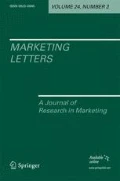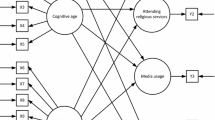Abstract
Older adults constitute a rapidly growing demographic segment, but relatively little is known about them within consumer contexts: how they process information, respond to persuasive messages, and make decisions. We discuss extant findings from consumer behavior and related disciplines (e.g., cognitive psychology, neuroscience, social psychology, gerontology) as they pertain to the effects of aging on consumer memory, persuasion and decision
Similar content being viewed by others
References
AARP Foundation. (2003). “Off the Hook: Reducing Participation in Telemarketing Fraud,” http://www.aarp.org/research/frauds-scams/telemarketing/aresearch-import-179-D17812.html.
Bechara, Antoine, Daniel Tranel, Hanna Damasio, and Antonio R. Damasio. (1996). “Failure to Respond Autonomically to Anticipated Future Outcomes Following Damage to Prefrontal Cortex,” Cerebral Cortex 6, 215–225.
Begg, Ian M., Ann Anas, and Suzanne Farinacci. (1992). “Dissociation of Processes in Belief: Source Recollection, Statement Familiarity, and the Illusion of Truth,” Journal of Experimental Psychology: General 121, 446–458.
Blanchard-Fields, Fredda, Heather Casper Jahnke, and Cameron Camp. (1995). “Age Differences in Problem-Solving Style: The Role of Emotional Salience,” Psychology and Aging 10, 173–180.
Blaney, Paul H. (1986). “Affect and Memory: A Review,” Psychological Bulletin 99, 229–246.
Carstensen, Laura L., Derek M. Isaacowitz, and Susan Turk Charles. (1999). “Taking Time Seriously: A Theory of Socioemotional Selectivity,” American Psychologist 54, 165–181.
Castel, Alan D., and Fergus I. M. Craik. (2004). “Memory for Numerical Information in Younger and Older Adults: The Role of Schematic Support,” Poster presented at the 10th Cognitive Aging Conference, Atlanta, Georgia.
Charles, Susan Turk, Mara Mather, and Laura L. Carstensen. (2003). “Aging and Emotional Memory: The Forgettable Nature of Negative Images for Older Adults,” Journal of Experimental Psychology: General 132, 310–324.
Clary, E. Gil, Mark Snyder, Robert D. Ridge, Peter K. Miene, and Julie A. Haugen. (1994). “Matching Messages to Motives in Persuasion: A Functional Approach to Promoting Volunteerism,” Journal of Applied Social Psychology 24, 1129–1149.
Craik, Fergus I. M., and Janine M. Jennings. (1992). “Human Memory.” In Fergus I. M. Craik and Timothy A. Salthouse (eds.), The Handbook of Aging and Cognition Hillsdale, NJ: Lawrence Erlbaum Associates, pp. 51–110.
Ende, Jack, Lewis Kazis, Arlene Ash, and Mark A. Moskowitz. (1989). “Measuring Patients' Desire for Autonomy: Decision Making and Information-Seeking Preferences Among Medical Patients,” Journal of General Internal Medicine 4, 23–30.
Federal Trade Commission Staff Report. (2002). “Weight Loss Advertising: An Analysis of Current Trends,” http://www.ftc.gov/opa/2002/09/weightlossrpt.htm.
Federal Trade Commission Staff Summary. (1999–2001). “Activities Affecting Older Americans,” http://www3.ftc.gov/os/2001/10/agingrpt.htm.
Fung, Helene H., and Laura L. Carstensen. (2003). “Sending Memorable Messages to the Old: Age Differences in Preferences and Memory for Advertisements,” Journal of Personality and Social Psychology 85, 163–178.
Fung, Helene H., and B. H. Ching. (2004). Age Differences in Goals: Its Implications for Health Promotion. Manuscript in preparation.
Glisky, Elizabeth L., Susan R. Rubin, and Patrick S. R. Davidson. (2001). “Source Memory in Older Adults: An Encoding or Retrieval Problem” Journal of Experimental Psychology: Learning, Memory, and Cognition 27, 1131–1146.
Hasher, Lynn, David Goldstein, and Thomas Toppino. (1977). “Frequency and the Conference of Referential Validity,” Journal of Verbal Learning & Verbal Behavior 16, 107–112.
Hedden, Trey, and John D. E. Gabrieli. (2004). “Insights into the Ageing Mind: A View from Cognitive Neuroscience,” Nature Reviews Neuroscience 5, 87–96.
Hedden, Trey, and Denise C. Park. (2003). “Contributions of Source and Inhibitory Mechanisms to Age-Related Retroactive Interference in Verbal Working Memory,” Journal of Experimental Psychology: General 132, 93–112.
Hibbard, Judith H., and Ellen Peters. (2003). “Supporting Informed Consumer Health Care Decisions: Data Presentation Approaches that Facilitate the Use of Information in Choice,” Annual Review of Public Health 24, 413–433.
Israel, Lana, and Daniel L. Schacter. (1997). “Pictorial Encoding Reduces False Recognition of Semantic Associates,” Psychonomic Bulletin & Review 4, 577–581.
Kahneman, Daniel, and Amos Tversky. (1973). “On the Psychology of Prediction,” Psychology Review 80, 237–251.
Kennedy, Quinn, Mara Mather, and Laura L. Carstensen. (2004). “The Role of Motivation in the Age-Related Positivity Effect in Autobiographical Memory,” Psychological Science 15, 208–214.
Krampe, Ralf T., and K. Anders Ericsson. (1996). “Maintaining Excellence: Deliberate Practice and Elite Performance in Younger and Older Pianists,” Journal of Experimental Psychology: General 125, 331–359.
Lambert-Pandraud, Raphaelle, Gilles Laurent, and Eric Lapersonne. (2005). “Repeat-Purchasing of New Automobiles by Older Consumers: Empirical Evidence and Interpretations,” Journal of Marketing 69, 97–113.
Law, Sharmistha, Scott A. Hawkins, and Fergus I. M. Craik. (1998). “Repetition-Induced Belief in the Elderly: Rehabilitating Age-related Memory Deficits,” Journal of Consumer Research 25, 91–107.
Light, Leah L. (1991). “Memory and Aging: Four Hypotheses in Search of Data,” Annual Review of Psychology 42, 333–376.
Liu, Linda Hand, Richard Gonzalez, and Denise C. Park. (2004). Judgment and Decision Making in Older Adults Manuscript in preparation.
Luce, Mary Frances. (1998). “Choosing to Avoid: Coping with Negatively Emotion-laden Consumer Decisions,” Journal of Consumer Research 24, 409–433.
Mather, Mara, and Laura L. Carstensen. (2003). “Aging and Attentional Biases for Emotional Faces,” Psychological Science 14, 409–415.
Mather, Mara, Marissa Knight, and Michael McCaffrey. (2005). “The Allure of the Alignable: False Memories of Choice Features,” Journal of Experimental Psychology: General 134, 38–51.
Mather, Mara, Eldar Shafir, and Marcia K. Johnson. (2000). “Misrememberance of Options Past: Source Monitoring and Choice,” Psychological Science 11, 132–138.
Meyer, Bonnie J. F., Connie Russo, and Andrew Talbot. (1995). “Discourse Comprehension and Problem Solving in an Ill-structured Domain: Decision About the Treatment of Breast Cancer by Women Across the Life Span,” Psychology and Aging 10, 84–103.
Miyake, Akira, Naomi P. Friedman, Michael J. Emerson, Alexander H. Witzki, Amy Howerter, and Tor D. Wager. (2000). “The Unity and Diversity of Executive Functions and Their Contributions to Complex “Frontal Lobe” Tasks: A Latent Variable Analysis,” Cognitive Psychology 41, 49–100.
Morrow, Daniel G., Von O. Leirer, Lisa M. Carver, Elizabeth Decker Tanke, and Allison D. McNally. (1999). “Repetition Improves Older and Younger Adult Memory for Automated Appointment Messages,” Human Factors 41, 194–204.
Mutter, Sharon A., and Rebecca M. Pliske. (1994). “Aging and Illusory Correlation in Judgments of Co-occurrence,” Psychology and Aging 9, 53–63.
Park, Denise C., J. Thomas Puglisi, and Anderson D. Smith. (1986). “Memory for Pictures: Does an Age-Related Decline Exist?” Psychology and Aging 1, 11–17.
Park, Denise C., Anderson D. Smith, Gary Lautenschlager, Julie L. Earles, David Frieske, Melissa Zwahr, and Christine L. Gaines. (1996). “Mediators of Long-term Memory Performance Across the Life Span,” Psychology and Aging 11, 621–637.
Peters, Ellen, Melissa L. Finucane, Donald G. MacGregor, and Paul Slovic. (2000). “The Bearable Lightness of Aging: Judgment and Decision Processes in Older Adults,” In National Research Council, Paul C. Stern & Laura L. Carstensen (eds.), The Aging Mind: Opportunities in Cognitive Research (Appendix C). Washington, DC: National Academy, pp. 144–165.
Petty, Richard E., and John T. Cacioppo. (1986). Communication and Persuasion: Central and Peripheral Routes to Persuasion. New York: Springer-Verlag.
Polyak, Ilana. (2000). “The Center of Attention,” American Demographics 22 (November), 30–33.
Rahhal, Tamara, Cynthia P. May, and Lynn Hasher. (2002). “Truth and Character: Sources that Older Adults can Remember,” Psychological Science 13, 101–105.
Rowe, John W., and Robert L. Kahn. (1998). Successful Aging. New York: Pantheon Books.
Reuter-Lorenz, Patricia A. (2002). “New Visions of the Aging Mind and Brain,” Trends in Cognitive Sciences 6, 394–400.
Skurnik Ian, Carolyn Yoon, Denise C. Park, and Norbert Schwarz. (2005). “How Warnings About False Claims Become Recommendations,” Journal of Consumer Research 31, 713–724.
Spencer, Wesley D., and Naftali Raz. (1995). “Differential Effects of Aging on Memory for Content and Context: A Meta-analysis,” Psychology and Aging 10, 527–539.
Steginga, Suzanne K., and Stefano Occhipinti. (2002). “Decision Making About Treatment of Hypothetical Prostate Cancer: Is Deferring a Decision an Expert-opinion Heuristic?” Journal of Psychosocial Oncology 20, 69–84.
Streufert, Siegfried, Rossanne Pogash, Mary Piasecki, and Gerald M. Post. (1990). “Age and Management Team Performance,” Psychology and Aging 5, 551–559.
Tversky, Amos and Daniel Kahneman. (1983). “Extensional Versus Intuitive Reasoning: The Conjunction Fallacy in Probability Judgment” Psychological Review 90, 293–315.
Williams, Patti and Aimee Drolet. (2005). “Age-related Differences in Responses to Emotional Advertisements,” Journal of Consumer Research (forthcoming).
Yoon, Carolyn. (1997). “Age Differences in Consumers' Processing Strategies: An Investigation of Moderating Influences,” Journal of Consumer Research 24, 329–342.
Yoon, Carolyn and Michelle P. Lee. (2004). “Persuasion Implications of Age-related Differences in Consumer Processing: The Effects of Motivation and Ability” Working Paper, University of Michigan.
Zacks, Rose T., Lynn Hasher, and Karen Z. H. Li. (2000). “Human Memory.” In Fergus I. M. Craik and Timothy A. Salthouse (eds.), The Handbook of Aging and Cognition (2nd ed.). Mahwah, NJ: Lawrence Erlbaum Associates, pp. 1–90.
Author information
Authors and Affiliations
Corresponding author
Additional information
The first two authors co-chaired the workshop at the Choice Symposium and made major and equal contributions to this article. The remaining authors were participants in the workshop. They also contributed to this article and are listed in alphabetical order. We wish to thank the editor and Cathy Cole for their helpful comments on the paper. The article, including a more complete list of references, was shortened to meet the page-length constraints of the special issue. The longer version is available upon request from the senior authors.
Rights and permissions
About this article
Cite this article
Yoon, C., Laurent, G., Fung, H.H. et al. Cognition, Persuasion and Decision Making in Older Consumers. Market Lett 16, 429–441 (2005). https://doi.org/10.1007/s11002-005-5903-3
Issue Date:
DOI: https://doi.org/10.1007/s11002-005-5903-3




